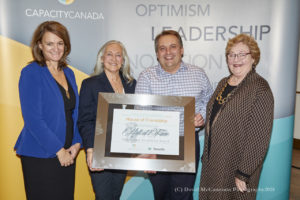It’s been nearly 80 years since a handful of kind-hearted women began serving meals to a small group of men in need from a storefront in downtown Kitchener.
It was from this humble start that House of Friendship grew and began promoting a strong a mission to help those who need food, housing, community resources or addiction treatment.
Today, its dedicated staff and volunteer provide service for approximately 42,000 people annually and that number is expected to rise since Waterloo Region is looking at a 30% to 50% population increase in the next 25 years.
To ensure House of Friendship can meet these growing needs, its management team have sharpened their governance skills the past few years by attending Capacity Canada’s Manulife Board Governance BootCamps.
“The board has realized the deep value of the BootCamp. I think it has empowered them to realize how important their role is and some of the things they need to work on,” said House of Friendship CEO John Neufeld, after the group won the Manulife Governance Excellence Award at the kickoff of Capacity Canada’s 10th anniversary BootCamp. Approximately 200 guests attended the event held Nov. 15 at The Walper Hotel.
Adjudicated and sponsored by Capacity Canada, this annual award recognizes a non-profit organization that implements new ideas and concepts in the year following their BootCamp attendance to improve overall board performance. The award comes with a $5,000 prize.
The two-day BootCamp, held this year Nov. 16-17 at the Holiday Inn Kitchener-Waterloo Conference Centre, provided training and information to help board leaders and top administrators of non-profits with a better understanding of their roles.
House of Friendship leaders were in attendance this year, as well as the previous two years.
“We’ve made a commitment to have all of them (leaders) to get this training,” said Neufeld, who also attended the BootCamp this year.
House of Friendship was among nine non-profits that were vying for the award after attending the 2017 BootCamp. A panel of judges, including long-time Capacity Canada faculty member Fred Galloway, selected the winning application.
Galloway said it wasn’t easy to task.
“There were three really good ones that separated themselves from the others,” he said. “I’ve never seen three that were that comprehensive in changing their governance.”
Following their training in 2017, the House of Friendship board and executive team made several significant governance improvements.
Some of them include: creating a bylaw and ad-hoc committee to focus on establishing an executive director evaluation, plus updating bylaws, policies and procedures and developing terms of reference for each committee; updated and approved bylaws that align with the existing Ontario NFP Corporation Act with the inclusion of gender neutral language; created terms of reference specific to each committee chair by a board director; and conducted an executive director performance review with feedback from senior leadership team members and board directors, with additional input and self-assessment from the executive director.
As well, House of Friendship will now have its executive director formulate annual goals aligned with its strategic plan goals and see an updated and revised job description.
“They were so comprehensive,” said Galloway. “They just didn’t take a little slice. They took more of a strategic view and multiple slices of enhancing their governance model and governance practices.”
House of Friendship Board Chair Mary Friesen said the organization is doing its due diligence in terms of governance to enhance its transparency.
“I think we have an accountability to our stakeholders, our community and the people we serve,” she said.
House of Friendship has a current revenue of approximately $11 million to provide services in Waterloo Region.
“I think the board is passionate about ensuring our mission and values are vital in our community and are relevant,” said Friesen. “I think we’ve done some work and we’re improving; we have more to go in terms of learning.”
As it continues to implement governance changes, House of Friendship is also moving towards implementing a new strategic direction thanks to its new 2018-2020 House of Friendship Strategic Plan.
Friesen said the training they’ve received from Capacity Canada has been transformational.
“We’ve really heightened our awareness,” she said.

